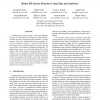Free Online Productivity Tools
i2Speak
i2Symbol
i2OCR
iTex2Img
iWeb2Print
iWeb2Shot
i2Type
iPdf2Split
iPdf2Merge
i2Bopomofo
i2Arabic
i2Style
i2Image
i2PDF
iLatex2Rtf
Sci2ools
MSS
2005
IEEE
2005
IEEE
Richer File System Metadata Using Links and Attributes
Traditional file systems provide a weak and inadequate structure for meaningful representations of file interrelationships and other context-providing metadata. Existing designs, which store additional file-oriented metadata either in a database, on disk, or both are limited by the technologies upon which they depend. Moreover, they do not provide for user-defined relationships among files. To address these issues, we created the Linking File System (LiFS), a file system design in which files may have both arbitrary user- or application-specified attributes, and attributed links between files. In order to assure performance when accessing links and attributes, the system is designed to store metadata in non-volatile memory. This paper discusses several use cases that take advantage of this approach and describes the user-space prototype we developed to test the concepts presented.
Additional file-oriented Metadata | Context-providing Metadata | MSS 2005 | Traditional file Systems |
Related Content
| Added | 25 Jun 2010 |
| Updated | 25 Jun 2010 |
| Type | Conference |
| Year | 2005 |
| Where | MSS |
| Authors | Alexander Ames, Carlos Maltzahn, Nikhil Bobb, Ethan L. Miller, Scott A. Brandt, Alisa Neeman, Adam Hiatt, Deepa Tuteja |
Comments (0)

